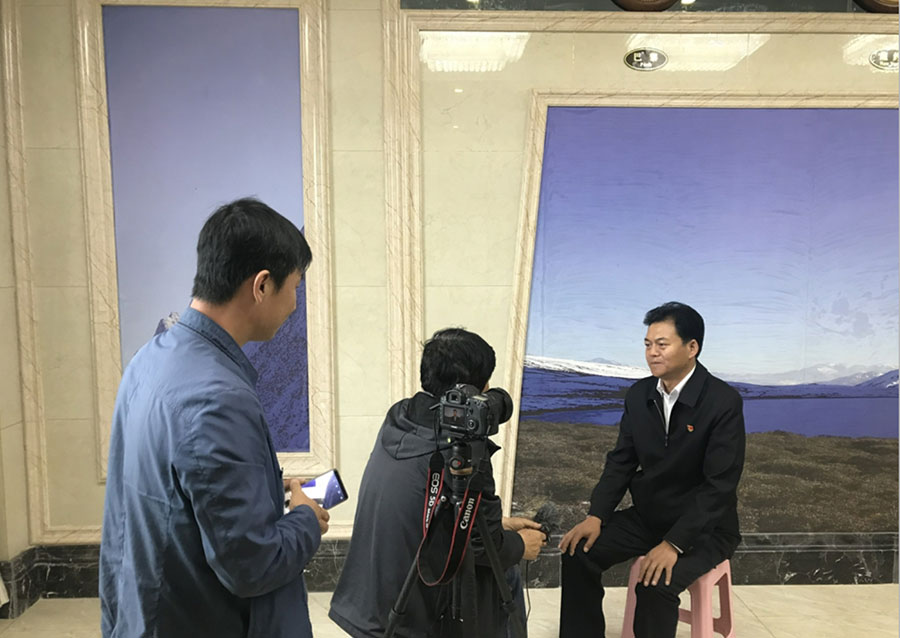

Video: Tibetan yaks roam around on the grassland.
So what can help herdsmen cast off poverty in a place where generations of nomadism led to a decentralized population distribution, scattered investment in infrastructure construction, a weak ability of urban centers to absorb rural people and strong restrictions on setting up industries?
The central and local governments have made relentless efforts for years. In 2015, the central government established a compensation mechanism for ecological protection among regions. Resources are shared between protected areas and areas that benefit economically, and between upstream and downstream watersheds. The benefits come through financial subsidies, industrial transfers, personnel training and joint construction of parks.
Wang Enguang, deputy director-general of the Qinghai Forestry and Grassland Bureau, said Qinghai Province has created jobs as grassland ecological guardians for 49,000 registered poor people. About 17,000 of them are from the Three-River-Source region. Each of them can receive 1,800 yuan ($260) per month.
These posts can help lift the local people out of extreme poverty. In addition, herdsmen can also protect the grass, trees and mountains in their hometown, said Wang.
At the county-level, Li said Qumalai has set up more than 60 ecological animal husbandry cooperatives, which optimize resources and transform the traditionally extensive and inefficient animal husbandry industry into operating in a more intensive and efficient way.
Most importantly, these cooperatives can largely operate with less labor, enabling young herdsmen to accept vocational education and skills training, including haircutting, cooking, automobile and motorcycle repair, sewing and financial management of cooperatives.
Cheng Lin is such a beneficiary at the government-initiated skills training center. From an illiterate grassland girl to a chef in a Qumalai county government canteen, from a poor family living in distress to an employee with a fixed salary of 5,000 yuan ($711)per month, Cheng herself had never imagined such a transformation could ever occur to her.
Qumalai is largely a pastoral area which offers limited job opportunities. Li said the entrenched pastoral culture makes local residents lack an urge to compete. "Though they have skills, they are not used to going out to compete for better job opportunities."
As a local governor, Li is not worried about falling short of the goal of eradicating poverty by 2020, as the national poverty line of $436 can merely feed and clothe people. He is more concerned about how these people can go beyond this goal to be prosperous in a sustainable way.

Photo: Li Jian answers questions during an interview./ Credit to Wang Huijun
One of the problems with the poverty reduction situation in Qumalai and Qinghai Province, as both Li and Wang pointed out, lies in the fact that the some of the poverty reduction efforts still resemble a temporary solution, with little economic sustainability, even though the ecological and social benefits are significant.
Related:

 Award-winning photos show poverty reduction achievements in NE China's Jilin province
Award-winning photos show poverty reduction achievements in NE China's Jilin province People dance to greet advent of New Year in Ameiqituo Town, Guizhou
People dance to greet advent of New Year in Ameiqituo Town, Guizhou Fire brigade in Shanghai holds group wedding
Fire brigade in Shanghai holds group wedding Tourists enjoy ice sculptures in Datan Town, north China
Tourists enjoy ice sculptures in Datan Town, north China Sunset scenery of Dayan Pagoda in Xi'an
Sunset scenery of Dayan Pagoda in Xi'an Tourists have fun at scenic spot in Nanlong Town, NW China
Tourists have fun at scenic spot in Nanlong Town, NW China Harbin attracts tourists by making best use of ice in winter
Harbin attracts tourists by making best use of ice in winter In pics: FIS Alpine Ski Women's World Cup Slalom
In pics: FIS Alpine Ski Women's World Cup Slalom Black-necked cranes rest at reservoir in Lhunzhub County, Lhasa
Black-necked cranes rest at reservoir in Lhunzhub County, Lhasa China's FAST telescope will be available to foreign scientists in April
China's FAST telescope will be available to foreign scientists in April